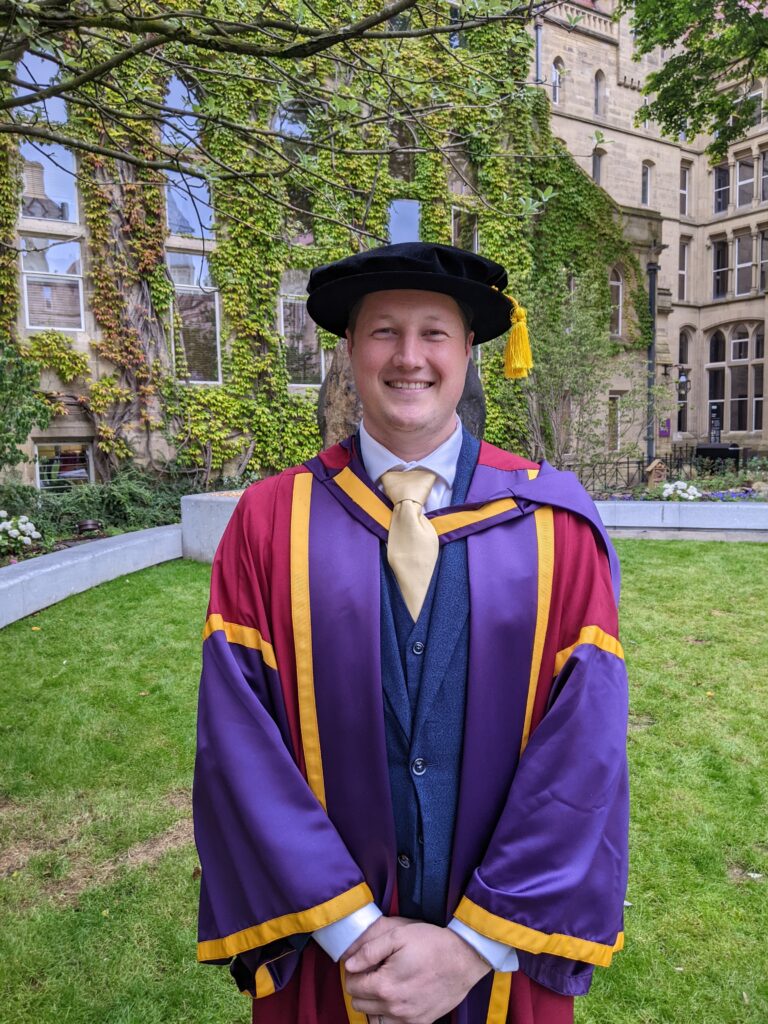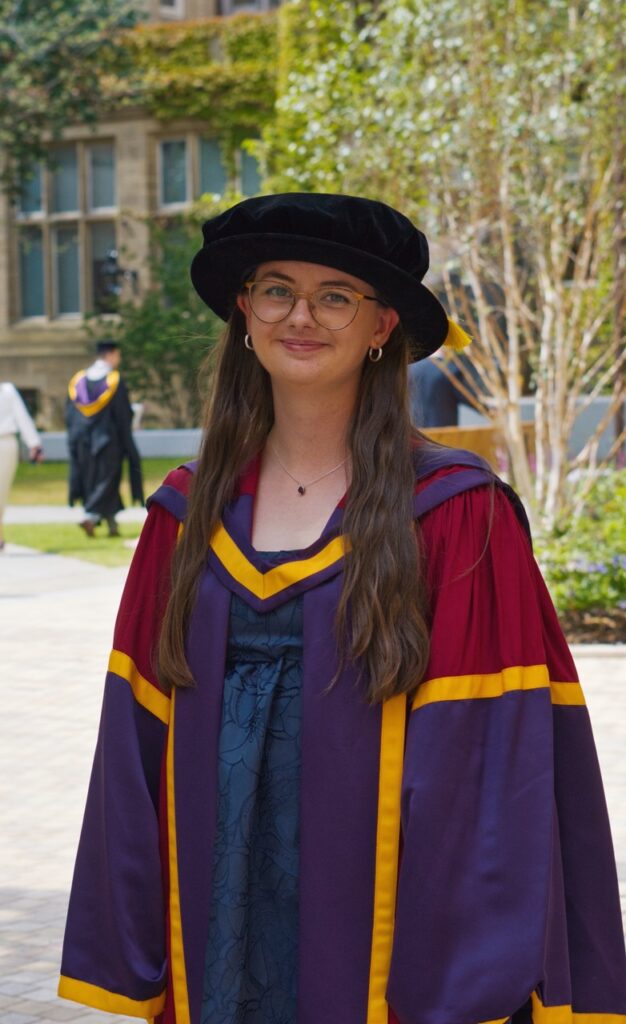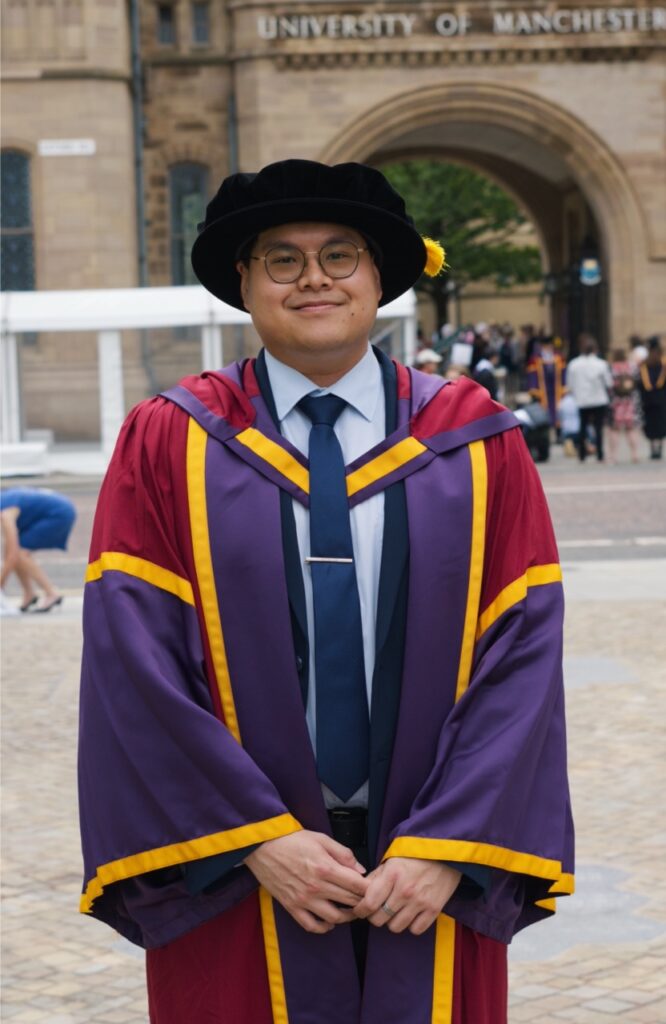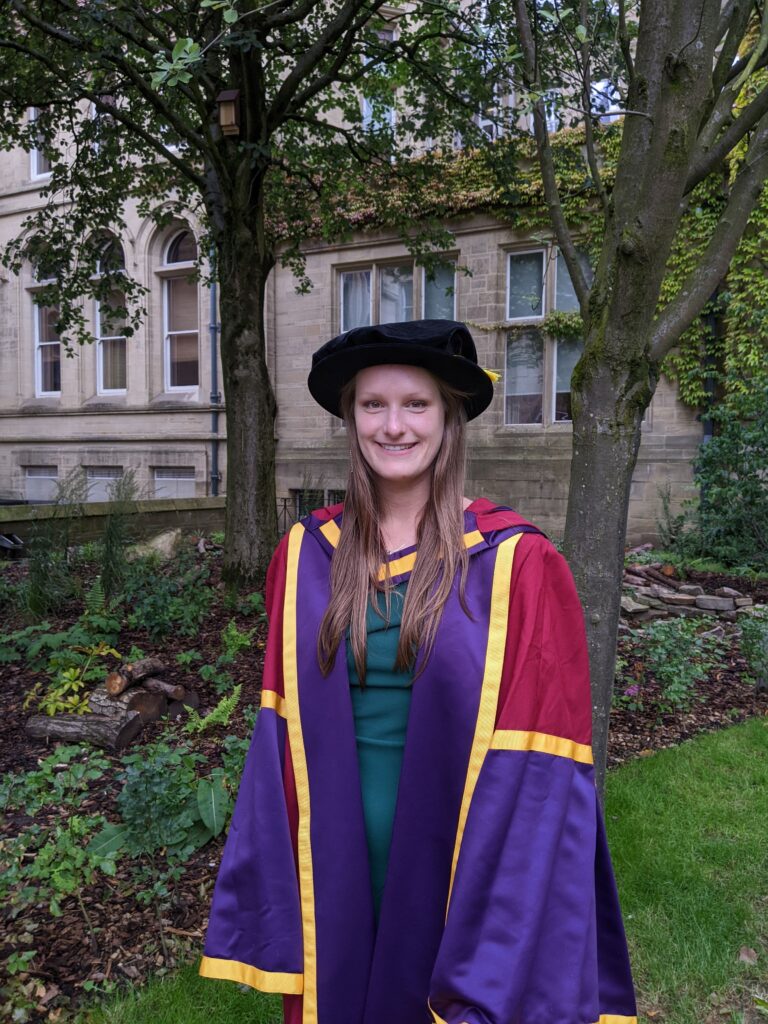As we prepare for the start of another academic year, we’re taking some time to reflect on the many areas that have benefited from donor support. Across the University, gifts from generous donors are helping to develop original thinkers and innovators who bring fresh perspectives to our research and accelerate breakthroughs that will improve society.
Creating more opportunities for early-career researchers is one of the ways that gifts are making a difference. By increasing the number of postgraduate researchers across our faculties, donors are playing a critical role in the search for world-changing solutions. And creating opportunities for talented people to begin their research careers.
In this post, you will meet four of the people who completed their PhDs at Manchester this summer. We hope you’ll enjoy reading about their experience as well as their exciting future plans!

Meet Andrew
Andrew completed a PhD in Biological Sciences. Andrew received the Marsh Doctoral Scholarship, generously supported by John and Liz Davies.
“The ACTB gene is a protein-coding gene within the human body. If it becomes mutated, it can cause a range of developmental disorders – like Baraitser-Winter syndrome, which affects the development of both the body and the brain.
These disorders remain poorly understood, thus making their diagnosis, management, and treatment challenging. The work I completed created a resource for clinical and genetic classification of ACTB related disorders to help increase knowledge and understanding of the ACTB gene, and support future discovery.
I am currently working at the University in a research lab as an infection technician while I find a postdoctoral position that aligns with my research goals and interests.
I would like to thank the Davies family so much for their continued support and generosity for my own personal funding but would also like to thank other donors for the support that they provide to other students. Without their support, much of the ground-breaking research would not be possible.”

Meet Ellen
Ellen completed a PhD in Particle Physics. Ellen received the George Rigg Presidential PhD Scholarship in Particle Physics, generously supported by The Rigg Family.
“Dark matter is one of the most mysterious phenomena in physics today – dark matter has been hypothesised for almost a century and it is thought to make up 85% of the matter in the universe, but we know very little about it and have never directly observed it. For my PhD I worked within a large international collaboration called DarkSide which is currently constructing a detector in a deep underground laboratory in the mountains of Gran Sasso, Italy. The inner detector will be filled with around 50 tonnes of liquid argon and we hope to observe galactic dark matter entering the detector and scattering argon nuclei, producing measurable light and charge signals.
A main theme of my PhD work involved investigating some of the usual assumptions made about dark matter, looking for potential blind spots in our sensitivity, and extending searches beyond the usual dark matter mass range and interaction type. We found some really interesting results, including dark matter could interact with protons differently to neutrons, and the consequences for experiments using argon or xenon as the target detector. My research helped the scientific community get one step closer to better understanding dark matter.
I have been really fortunate to be able to continue carrying out particle physics research beyond my PhD, as I now have a job as a post-doctoral research associate at the University of Liverpool.
I am so thankful to the Rigg family who have supported my PhD, but also to all the generous donors who support and enable people to carry out postgraduate research – thank you!”

Meet Francis
Francis completed a PhD in Nano and Functional Materials, supported by our donor community.
“My PhD research was in the Department of Materials focusing on the implementation of two-dimensional metallic materials called MXenes for next generation energy storage devices such as lithium-ion batteries, lithium sulphur batteries, and supercapacitors. These batteries enhance energy density and lifespan, making energy storage systems more efficient and cost-effective. The aim of my research was to facilitate the development of more stable energy storage devices that can charge/discharge faster, whilst retaining its performance across a longer product lifespan. This work will help overcome the main energy storage challenges surrounding cost, capacity limitations, and environmental impacts.
Manchester is unique, as it possesses a broad range of technical capabilities all within its own campus. Combined with this is a truly international research community, that makes collaborative research a very interesting and engaging experience.
After graduation, I hope to be able to apply my expertise to inform both industrial strategy and social policy, to build more resilient and sustainable communities on our rapidly evolving planet.
I would like to sincerely thank all the donors who support PhDs here at Manchester. Without their support, I would have been unable to conduct such groundbreaking research and contribute to an international collaborative community. With the continued support from these generous donors, I hope that Manchester can continue to bring in students and candidates from diverse and under-represented backgrounds and continue building upon its innovative and vibrant research community.”

Meet Lucy
Lucy completed a PhD in Immunology, supported by our donor community.
“My research topic was a lab-based project in the field of immunology, focusing on the immunological link between the skin and the respiratory system, and how inflammation and infection in one tissue might impact the immune system in another. My research worked towards preventing and curing inflammatory diseases to improve patient quality of life and to make a real difference to the wider scientific community. This is a topic close to my heart, so having the opportunity to perform research that could contribute to helping those impacted by skin diseases on it has been incredibly meaningful.
My next steps have been to secure a job in a biotech company based in Scotland, working as a Research & Development scientist for post viral diseases. I have been working there for a few months now and absolutely love it.
Receiving a scholarship made a huge difference to my career as without it, my research would not have been possible. It also gave me the opportunity to travel to conferences in different cities and to meet other scientists at the cutting edge of my research. I have made some friends for life through my time at Manchester, and I will be forever grateful for this.
I would just like to say a massive thank you to the donors who supported my PhD, and others like mine. None of this would have been possible without your kindness and generosity, and it has not only changed my life, but hopefully that of others who my research and future work will hopefully touch.”

